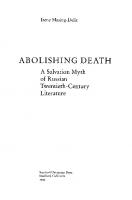Abolishing Death: A Salvation Myth of Russian Twentieth-Century Literature 9780804766425
The idea of abolishing death was one of the most influential myth-making concepts expressed in Russian literature from 1
133 82 22MB
English Pages 376 [384] Year 2022
Recommend Papers

- Author / Uploaded
- Irene Masing-Delic
File loading please wait...
Citation preview
Abolishing Death
Irene Masing-Delic
ABOLISH ING DEATH A Salvation Myth of Russian Twentieth-Cent ury Literature
Stanford University Press Stanford, California I992
Stanford University Press Stanford, California © I 992 by the Board of Trustees of the Leland Stanford Junior University
CIP data are at the end of the book
In Memory of Wolfgang Masing Yurii Semyonov Johannes von Guenther Anders Sjoberg Bo Setterlind
Preface
THE PRESENT STUDY was conceived and begun in 1979 at the Friedrich Wilhelm Alexander Universitat, Erlangen-Nurnberg, in the then Federal Republic of Germany. The idea to explore the theme of "abolishing death" in Russian twentieth-century literature was encouraged by Professor Dr. Joseph Schutz, head of the Slawisches Seminar, Erlangen. With his support and the financial assistance of the Stiftung Volkswagenwerk, Hannover, a series of seminars devoted to the topic was conducted at the University of Erlangen. I appreciate the stimulating contributions to the theme of "abolishing death" by the seminar participants and the opportunity to develop my ideas in discussions and colloquia. No one protested against researching such a strange topic; all were prepared to investigate its potential. I also feel greatly indebted to Professor Wolfgang Kasack, head of the Slawisches Seminar, Cologne, for valuable discussions and encouragement of the project. In particular, I owe the Stiftung, Professor Schutz, and Professor Kasack an acknowledgment for infinite patience. All conveyed the encouraging impression that they believed the project was a worthwhile venture. After Erlangen, I continued my research at the University of the Witwatersrand, Johannesburg, South Africa, where I took up an appointment as lecturer in 1980. It was finalized during a sabbatical leave granted in 1986. I gratefully acknowledge the financial support of the University and the Human Sciences Research Council (South Africa), which made travel to the United States possible. The sabbatical year was spent at the
Preface
Vlll
Department of Slavic Languages and Literatures, University of California, Berkeldy, and the Slavic and East European Center of the University of Illinois, Urbana. I am much indebted to my colleagues at the University of California for helpful discussions, particularly Professors Joan Grossman and Hugh McLean, who offered critical advice and suggestions. I thank all my colleagues there for their encouragement, and appreciate the opportunities I had to test out my ideas in public lectures and private discussions. I also would like to thank the participants in the graduate seminar at Berkeley, who, like those previously at Erlangen, were prepared to investigate a lugubrious topic in a spirit of humorous tolerance. The time spent at the University of Illinois was invaluable. I thank the Slavic Center for the Independent Scholars Grant I was awarded, which enabled me to do research at the University's splendid library for several months in 1986. I appreciate the friendly interest that Professors Ralph Fisher, Marianne Tax Choldin, and Maurice Friedberg showed in my project. The work was finally completed after I joined the faculty of the Department of Slavic and East European Languages and Literatures at the Ohio State University in 1987. The congenial atmosphere facilitated the completion of my manuscript. Finally I would like to thank my husband, George Delic, for his inspiring interest in topics far removed from his own research sphere and his readiness to discuss them for over a decade. His loyal support was essential to the completion of the work. This work was thus begun twelve years ago, when the Soviet Union still lived by an ideology that has now largely collapsed. I do not think that an investigation of the USSR's previous salvation myths, including the victory over death as dealt with here, has become irrelevant. Now that the official myth of the omnipotence of mankind and the semiofficial myth of godlike man abolishing death have lost their power, their previous force needs to be fully examined as the background against which to understand the current return to past values. I hope that this study demonstrates the influence of a once powerful myth on Russian twentiethcentury literature. The present study covers the period from the turn of the century to the early 193o's. A sequel taking the myth to the 196o's may follow someday. Chapters 8 and 10 grew out of articles previously published in Scando-Slavica, Russian Review, and Slavic and East European Journal. The system of transliteration used is a modified version of the Library of Congress system with -skii rendered as -sky and no soft signs marked in names, and with e rendered as ye between vowels (but not in the beginning of words) and e, H, and 10 rendered as yo, ya, and yu rather than ia and iu.
Columbus, Ohio
1991
/.M.-D.
Contents
ONE TWO THREE FOUR FIVE SIX SEVEN EIGHT NINE TEN ELEVEN TWELVE
Introduction The Salvation Program General Contexts Nikolai Fyodorov Vladimir Solovyov Maksim Gorky Fyodor Sologub Aleksandr Blok Nikolai Ognyov Nikolai Zabolotsky Two Parodies Conclusion Notes Works Cited Index
I
26 38 76 105 123 155 195 222 243 287 295 307 339 353
Abolishing Death
If there is no immortality, reason will sooner or later invent it. -GROMOV IN ANTON CHEKHOV'S "A BORING STORY"
CHAPTER ONE
Introduction
DURING HIS lecture tours of Russia in the early 192o's, Ilya Erenburg was often asked whether communism would overcome death (1982, 2: 76). Nikolai Berdyayev reports that at a meeting of an anarchist club he attended in 1919, a biocosmist stated that "since the maximum social programme had already been put into practise, 'the cosmic resurrection of the dead"' would occur any moment (r962b: 227). 1 This statement was greeted with "an uproar of laughter" but apparently not with the incredulity an audience would display if it was hearing this sort of thing for the first time. Forty years later, we find the same theme often being sounded in the journal Science and Religion. In its September 1965 issue, for example, it published an article entitled "Is Immortality a Fairy Tale?," in which academician V. F. Kuprevich suggested that death was outmoded now that man controlled nature and the laws of evolutionary selection had been invalidated. Consequently, the "change of generations" had become superfluous ( 1965: 32). His article was but one of many published in Soviet journals in the 196o's speaking "about immortality as an imminent event to be concretely realized in a very near future" (Filippov 1981: 231). Optimism was indeed often boundless, as another Nauka i religiya article published a few months earlier, demonstrates. Here the reader is told that "in due course death
If there is no immortality, reason will sooner or later invent it. -GROMOV IN ANTON CHEKHOV'S "A BORING STORY"
CHAPTER ONE
Introduction
DURING HIS lecture tours of Russia in the early 192o's, Ilya Erenburg was often asked whether communism would overcome death (1982, 2: 76). Nikolai Berdyayev reports that at a meeting of an anarchist club he attended in 1919, a biocosmist stated that "since the maximum social programme had already been put into practise, 'the cosmic resurrection of the dead"' would occur any moment (r962b: 227). 1 This statement was greeted with "an uproar of laughter" but apparently not with the incredulity an audience would display if it was hearing this sort of thing for the first time. Forty years later, we find the same theme often being sounded in the journal Science and Religion. In its September 1965 issue, for example, it published an article entitled "Is Immortality a Fairy Tale?," in which academician V. F. Kuprevich suggested that death was outmoded now that man controlled nature and the laws of evolutionary selection had been invalidated. Consequently, the "change of generations" had become superfluous ( 1965: 32). His article was but one of many published in Soviet journals in the 196o's speaking "about immortality as an imminent event to be concretely realized in a very near future" (Filippov 1981: 231). Optimism was indeed often boundless, as another Nauka i religiya article published a few months earlier, demonstrates. Here the reader is told that "in due course death
2
Introduction
will be treated medically, as flu, pneumonia, and tuberculosis are nowadays." This prospect was no "religious fairy tale, like the reviving of Lazarus by Jesus Christ," the author insisted, but a realistic expectation based on the potential of a developing resuscitative science (Klyachko I965: p). Such opinions well illustrate what the historian Peter Wiles calls the "inordinate interest in physical immortality on earth" in the USSR (I965, 2: I 59). One of the first Western scholars to note this trend, Wiles imputes it to a general Russian attitude that says there has to be either "life after death-or no death," preferably the latter (I965, I: I4o). 2 Although intrigued by this quest for a world without death, he does not consider it of great importance (I 96 5, 2: I 6 I), since its repercussions are largely limited to "curious phrases" in some literary works and oddities in medical research policies. That evaluation of the search for immortality is justified in the case of the social historian, but for the literary scholar, "curious phrases" in literary works offer interpretative challenges. It is exactly such curious phrases that this study attempts to decipher, together with other puzzling aspects of twentieth-century literary texts dealing with the prospect of eliminating death. Boris Pasternak's Doctor Zhivago, for example, chooses to shoot at a dead tree during a Civil War battle instead of the soldiers on either side. We can interpret that act as reflecting Doctor Life's wish to demonstrate to the warring parties that they should kill death symbolized by the dead tree rather than each other. Zhivago's behavior proves to be guided by reasons that make sense on the symbolic level (see Masing-Delic I98I). Pasternak's novel is not analyzed in this study, but it certainly belongs to those texts in which many curious phrases and incidents acquire meaning when related to the quest for physical immortality on earth. But this study has a larger aim than deciphering specific riddles, intriguing as that exercise is. My goal is to examine the entire structure of a literary myth in twentieth-century pre- and postrevolutionary Russian literature positing earthly immortality and also to elucidate its formation by looking at its religious, philosophical, and ideological sources. The study will proceed by analyzing Russian literary texts from the turn of the century to the 193o's (Maksim Gorky, Fyodor Sologub, Aleksandr Blok, Nikolai Ognyov, and Nikolai Zabolotsky) against the background of some speculative Russian and European thought systems from the nineteenth and twentieth centuries (Dmitrii Pisarev, Nikolai Fyodorov, Vladimir Solovyov, Friedrich Nietzsche, Henri Bergson, and others). Considering the fact that the elimination of death-despite a rapidly growing literature on the subject3-is still an extravagant topic, let me make some introductory remarks of a general nature before defining the more specific goals to be pursued in this examination of a powerful lit-
Introduction
3
erary myth. To begin with, what kind of a spiritual climate would give rise to the conviction that human beings could become immortal in the most literal sense of the word? One thing that undoubtedly allowed this idea to take root was the decline of traditional Russian Orthodoxy, first in prestige and then in status. Like the other branches of Christianity, Russian Orthodoxy offers immortality only after death, in a spiritual dimension not to be found on earth, at least not for the time being. But atheists and materialists from the 186o's onward did not find transcendental paradises material enough to be real. They dismissed these celestial realms and the immortality found there as fairy tales without any scientific foundation. The rejection of this alternative opened up the "no death alternative" mentioned by Wiles. This does not mean, however, that only atheistic materialists came to embrace the option of physical immortality in an earthly paradise. So did deeply religious people. In fact, Orthodoxy may well have significantly contributed to the notion of the feasibility of physical immortality. Wiles, for example, traces the interest in immanent immortality to the Russian religious heritage. Since Russian Orthodoxy emphasizes the "Resurrection of Our Lord" and regards matter as "spirit-bearing" and spirit as an "improved sort of matter," the evolution of the cosmos could be viewed as a gradual transformation of matter into spirit, guided by God (Wiles 1965, 1: u8). It could be seen as a gradual victory of the forces of life over death, climaxing in immortality, this "other, more emphatic, name for life eternal" (Pasternak 1958: 9). Thus Orthodoxy could be seen as offering two messages in regard to immortality, one stating the traditional view of posthumous immortality, the other, a postapocalyptic vision of earthly immortality as the "real thing" with spiritual immortality as an interim solution. This duality explains the fact that Orthodoxy both declined and retained its influence. Atheist radicals, for example, rejected the traditional church often in violently militant terms while demanding that many of its ideals and aspirations become reality here and now. Orthodoxy was furthermore only partly rejected by religious groups, such as the Godseekers from the turn of the century. These did not desire the elimination of traditional faith (what the symbolist philosopher-writer Dmitrii Merezhkovsky termed "Historical Christianity") but rather a "new religious consciousness" (see Rosenthal 1977: 622). It was time, for example, to replace the current and traditional notion of spiritual immortality with one where death was no more and all men lived forever. In other words, it was time for the Orthodox church to preach its own "true" doctrines, which stated that a transformation of matter and mortal man was feasible. Thus sociopolitical revolutionaries and spiritual heretics of diverse per-
4
Introduction
suasions could well agree that the Christian notion of a world without death was sound while rejecting the idea that God, during a final showdown called the Last Judgment, would decide when and where the victory over death was to occur. In fact, heretically inclined materialists and unconventional religious thinkers could share considerable ideological space. To lean on Wiles once more, he believes some aspects of a religion that regards matter as spirit-bearing could be brought into harmony with an Engelsovian vision of matter moved by dialectics, the latter playing "the part of spirit" (I965, I: I 30 ). On this basis, the notion of physical immortality as a gradual spiritualization of matter could gain respectability for those who saw themselves as rational materialist thinkers. Similarly, Christians seeking a revitalization of faith could support the idea that death should be abolished as soon as possible without necessarily feeling they were going against Christian thought, since Revelations stated that death not only had been deprived of its sting by the prospect of celestial bliss but also was to be eliminated as a phenomenon at some point. Orthodoxy even intimated that the elimination of death somehow lay embedded in an evolutionary plan conceived by God himself, who desired that matter become spiritualized, although he left unspecified the time when this transfiguration, initiated by him, would take place. Since present-day duality was bound to become monistic synthesis, however, the sooner this happened, the better. Human initiative should hasten the advent of a deathless world. On the other hand, there was also official atheist Marxism-Leninism, and this ideology opposed both innovative and traditional Orthodox beliefs as well as revisionist tendencies within its own thought system. Furthermore, it demanded no less, and in fact more, loyalty from its adherents than Christian Orthodoxy, being correspondingly less tolerant of opponents of any kind, including its own heretics. Unlike religion, ideology considers all its doctrines rational and verifiable. The ideology of Marxism-Leninism is no different; it regards its doctrines as logically proven and consequently views any form of doubt or deviation as a manifestation of perverse obstinacy or a fatal social taint, a kind of inherited social sin. A useful distinction between religion and ideology is that religion is based on faith, or a "conscious unknown," whereas ideology, likewise based on faith, imagines this faith to be proven. Lenin, for example, "does not know that he believes. He believes that he knows" (Besan









